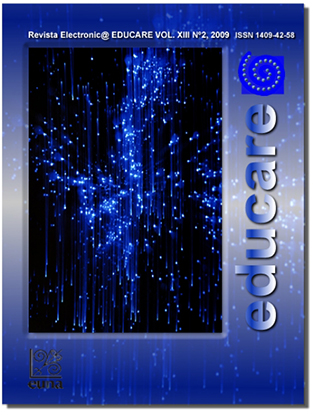Pedagogía intercultural: ¿un eufemismo para tranquilizar conciencias o una alternativa para la transformación?
DOI:
https://doi.org/10.15359/ree.14-1.7Keywords:
pedagogy, critical, intercultural, difference, discrimination, euphemism and social exclusionAbstract
The present article it entails the revision of some aspects of the Costa Rican pedagogy, especially in the epistemology area, ethics and the policies as fundamental dimensions of education. From there, it also proposes the revision of its intercultural practices in order to determine whether what it is called in the CIDE (UNA) Intercultural Pedagogy it is just another euphemism than comes from outside and above. If we receive it without major analysis in order not to disturb our comfortable being in the world, reality, or as an alternative of transformation of the Costa Rican society.
References
Brecht, B. (1934). Las cinco dificultades para decir la verdad. Recuperado el 5 de enero, 2009, de
http://www.lainsignia.org/2004/enero/cul_062.htm
Programa Estado de la Nación en Desarrollo Humano Sostenible. (2008). CONARE (Coord.). II
Informe sobre el Estado de la Educación Costarricense. San José, Costa Rica: Proyecto Estado
de la Nación.
Real Academia Española. (2001). Diccionario de la lengua española (22ª ed.). Madrid, España:
Espasa Calpe.
Skliar, C. (2007). La educación (que es) del otro. Argumentos y desierto de argumentos pedagógicos.
Buenos Aires, Argentina: Editorial Novedades Educativas.
Universidad Nacional de Costa Rica [UNA]. (2008, Junio). Procedimientos sobre los procesos de
enseñanza y de aprendizaje de la Universidad Nacional. Recuperado el 5 de enero, 2009, de
http://www.una.ac.cr//index.php?option=com_remository&Itemid=0&func=fileinfo&id=5
Villegas, R. (1986). El Tribunal Supremo de Elecciones y el Registro Civil de Costa Rica: análisis
jurídico, estructural y técnico. San José, Costa Rica: Tribunal Supremo de Elecciones.
Downloads
Published
How to Cite
Issue
Section
License
1. In case the submitted paper is accepted for publication, the author(s) FREELY, COSTLESS, EXCLUSIVELY AND FOR AN INDEFINITE TERM transfer copyrights and patrimonial rights to Universidad Nacional (UNA, Costa Rica). For more details check the Originality Statement and Copyright Transfer Agreement
2. REUTILIZATION RIGHTS: UNA authorizes authors to use, for any purpose (among them selfarchiving or autoarchiving) and to publish in the Internet in any electronic site, the paper´'s final version, both approved and published (post print), as long as it is done with a non commercial purpose, does not generate derivates without previous consentment and recognizes both publisher's name and authorship.
3. The submission and possible publication of the paper in the Educare Electronic Journal is ruled by the Journal’s editorial policies, the institutional rules of Universidad Nacional and the laws of the Republic of Costa Rica. Additionally, any possible difference of opinion or future dispute shall be settled in accordance with the mechanisms of Alternative Dispute Resolution and the Costa Rican Jurisdiction.
4. In all cases, it is understood that the opinions issued are those of the authors and do not necessarily reflect the position and opinion of Educare, CIDE or Universidad Nacional, Costa Rica. It is also understood that, in the exercise of academic freedom, the authors have carried out a rogorous scientific-academic process of research, reflection and argumentation thar lays within the thematic scope of interest of the Journal.
5. The papers published by Educare Electronic Journal use a Creative Commons License:














 The articles published by Educare Electronic Journal can be shared with a Creative Commons License:
The articles published by Educare Electronic Journal can be shared with a Creative Commons License: 



